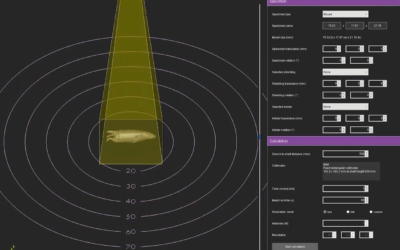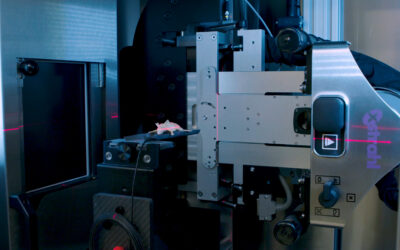Background: Radiation therapy is a standard established treatment modality for many malignancies, including lymphoma. There is growing evidence that the combination of radiation and immunotherapies can have synergistic immune and clinical effects; however, the mechanisms underlying these responses are poorly understood.
Hypothesis: We hypothesized that the potential beneficial effect of adding immunotherapy to radiation might be due to alteration of the tumor microenvironment (TME) to an inflammatory phenotype and the facilitation of T-cell infiltration.
Methods: Mice received two bilateral subcutaneous implant of 5 million A20 lymphoma cells each. When tumors are established (average tumor size = 45mm2, around Day 7~11), mice received intratumoral injection of G100, a synthetic TLR4 agonist, GLA-SE, tumor irradiation, or the combination of G100 and irradiation. X-ray radiation was delivered by using a Small Animal Radiation Research Platform (SARRP) with CT guided imaging that can accurately target lesions. Mice received a single dose of 10 Gy at one of the tumor implants. Intratumoral injection of G100 (10ug) was administered 3 times a week for up to 3 weeks, starting on the day post radiation.
Results: The combination of G100 and radiation had synergistic antitumor effects and demonstrated an abscopal effect with tumor growth delay in the non-treated contralateral tumor implant. Long-term tumor immunity was also demonstrated as the surviving mice rejected secondary tumor challenge. Study of the TME at gene expression and cellular levels showed that G100 induces a pro-inflammatory cytokine and chemokine milieu that induced T cell trafficking into the tumors. G100-treated tumors showed increased infiltration of T cells, including both CD4 and CD8 T cells. In contrast, tumors from animals that received only irradiation but no G100 had significantly decreased levels of T lymphocytes as compared to untreated tumors (9.5±2.0% T cells in irradiated tumors vs. 32.0±5.0% in untreated tumors, p=0.0076), due to the cytotoxic effect of radiation on lymphocytes. CD4 tumor infiltrating lymphocytes (TILs) were depleted by 72% (6.8±2.2% vs. 24.4±4.6%, p=0.02) and CD8 TIL were depleted by 77% (1.5±0.3% vs. 6.6±0.7%, p=0.0004) in irradiated mice as compared to untreated mice. In the irradiation and G100 combination treatment group, the tumors had levels of T cells that were close to non-irradiated animals.
Conclusion: The anti-tumor effect of irradiation is synergistically enhanced by concomitant intratumoral treatment by G100, which also results in abscopal responses and durable anti-tumor immunity. The modulation of the TME by G100 after irradiation also rescues the T-cell depletion caused by irradiation allowing for an influx of T cells. These preclinical results support the rationale for an on-going Phase 1/2 clinical trial in low-grade follicular non-Hodgkin’s lymphoma (NHL) patients, who are randomized to receive G100 following local radiation with or without pembrolizumab (NCT02501473).
Hailing Lu, Eric Ford, Jeffrey L Schwartz, Jessica Hewitt, Frank J Hsu, Jan ter Meulen and Ramesh Rengan






